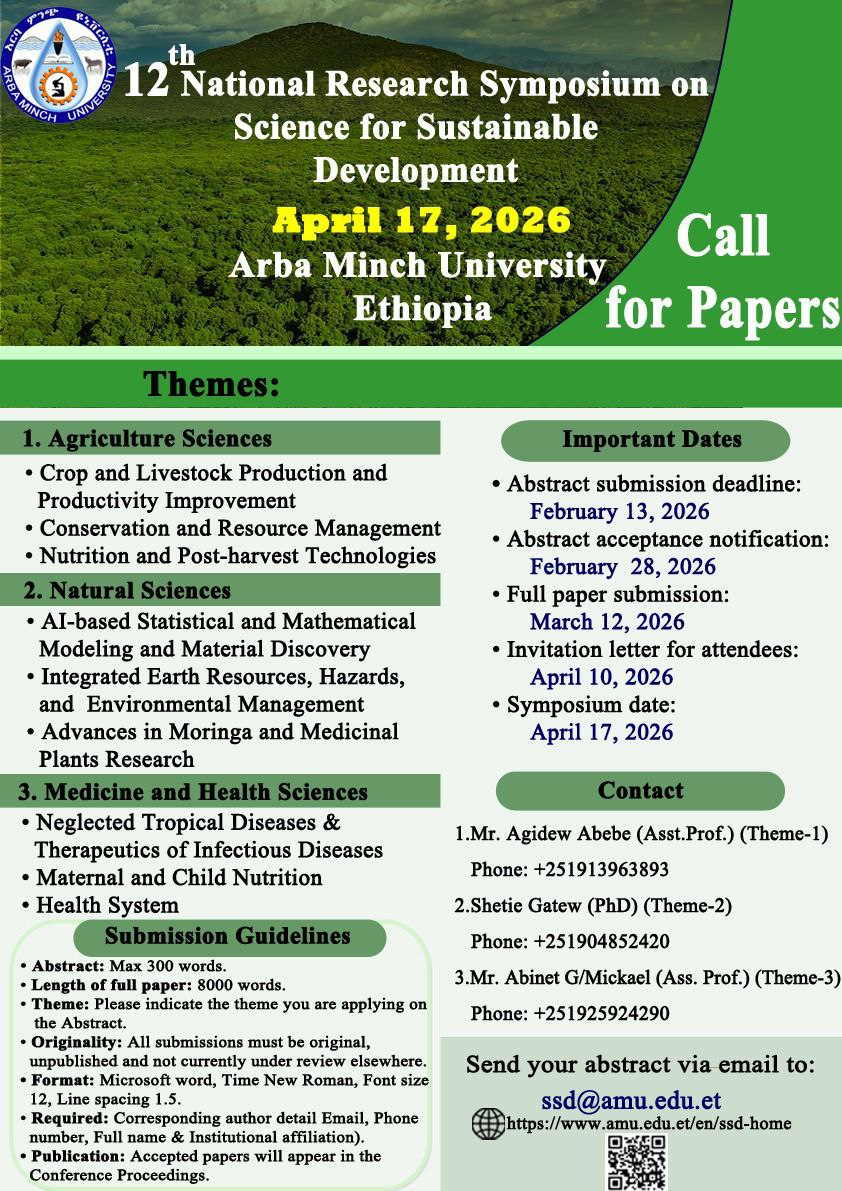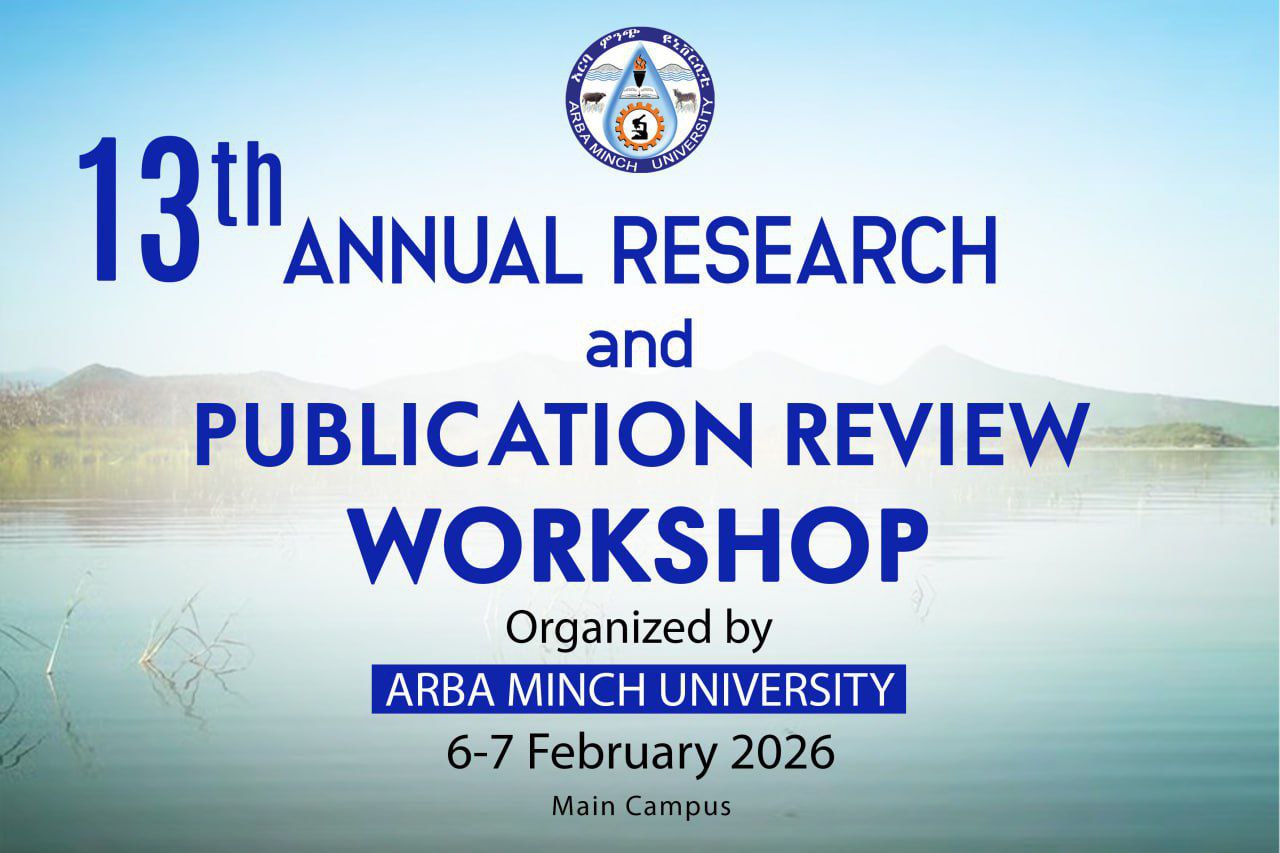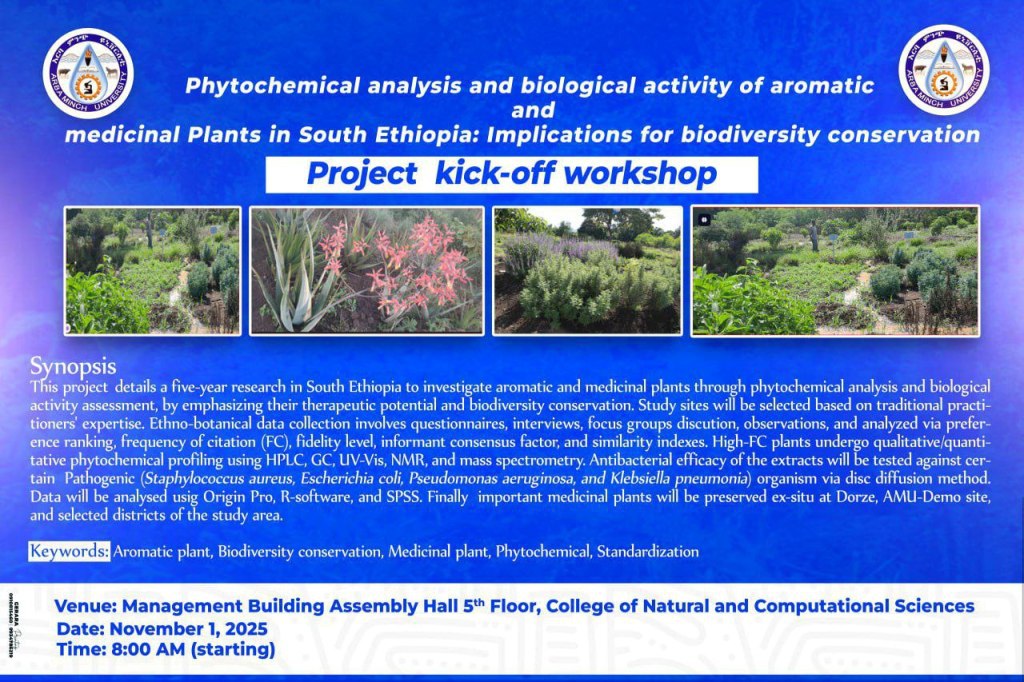Arba Minch University (AMU) officially launched a project focusing on Aromatic and Medicinal Plants (AMPs) in the South Ethiopia on November 1, 2025, at the university’s Abaya Campus. Click here to see more photos.
Dr. Ashenafi Hailu, Delegate for the Vice President for Research and Cooperation and Director for Grant and Collaborative Project Management at AMU, noted in his key note that the day marked a pivotal moment in their collective journey to explore, understand, and conserve the rich botanical heritage of South Ethiopia Region. He said the gathering was not only to celebrate the start of a scientific endeavor but also to reaffirm AMU’s long-standing partnership with the Armauer Hansen Research Institute (AHRI). Dr. Ashenafi underscored that both AMU and AHRI are committed to promoting the sustainable development of indigenous knowledge and biodiversity conservation, particularly focusing on aromatic and medicinal plants and the traditional healing practices. He added that the collaboration aims to document traditional knowledge, identify and characterize bioactive compounds, and screen them for potential use in developing modern antibiotics.
Dr. Ashenafi noted that the South Ethiopia Region is a treasure trove of Aromatic and Medicinal Plants, many of which remain underexplored, undocumented, and undervalued. He emphasized that these plants are not merely biological specimens but cultural assets, ecological stabilizers, and potential sources of novel bioactive compounds. He added that the project aims to bridge traditional wisdom with modern science by conducting rigorous phytochemical analyses, evaluating the biological activities of these plants, and linking the findings to indigenous knowledge systems.
Dr. Mulugeta Habte, Dean of the College of Natural and Computational Sciences, stated that the official launch of the collaborative project marks not merely a procedural milestone but the beginning of a significant scientific journey. He emphasized that such an ambitious endeavor demands synergy, precisely what the AMU–AHRI partnership embodies. Dr. Mulugeta explained that AMU contributes deep regional expertise, strong connections with local communities, access to diverse ecological zones, and the dedication of its young and talented researchers and students. Meanwhile, AHRI, as a leading biomedical research institute, offers world-class laboratory infrastructure, adherence to rigorous international standards, and specialized expertise in drug discovery and disease mechanisms, he said. He further noted that the project calls for diligence, patience, and unwavering scientific integrity from the research teams, underscoring that they are the pioneers who will bridge traditional wisdom with cutting-edge laboratory science.
Dr. Mulugeta Guta, representative of AHRI’s Traditional and Modern Medicine Research and Development Directorate, presented a paper on AHRI’s ongoing medical product initiatives. In his remarks, he noted that the purpose of the partnership is to complement each other’s strengths and address mutual gaps. He explained that while AMU may lack certain resources such as specialized chemicals or expert personnel, AHRI faces similar limitations in other areas. By working collaboratively and complementing one another, he emphasized, both institutions can effectively achieve the objectives of the project.
Mr. Atalay Azene, Project Coordinator, stated that the research team comprises staff members from several colleges, including the College of Agriculture, the College of Medicine and Health Sciences, and the College of Natural and Computational Sciences. He explained that the project entails a five-year research program in South Ethiopia Region, aimed at investigating aromatic and medicinal plants through phytochemical analyses and biological activity assessments, with a focus on their therapeutic potential and biodiversity conservation.
Mr. Atalay highlighted that the project also emphasizes the documentation, recording, and integration of the indigenous knowledge. At the conclusion of the study, key medicinal plants will be preserved at the Demo and Dorze AMU Demonstration Site and in selected districts across the study area, he said. Mr. Atalay also remarked that the preserved plants are expected to support the production of high-quality medicines, cosmetics purpose, serve as tourist attractions, and provide research opportunities for AMU students, researchers, and other scientific communities. The main aim of conducting the extensive study of the project is to provide formulated and standardized products to the community and AMU, he expressed.
Mr. Deyasa Deneke, traditional healer from Gardula Zone Derashe, said, working with expertise on traditional medicines is very important. We can gain Knowledge regarding doze and usage, he aspired.
Two papers from AHRI and AMU were presented during the event, prompting participants to raise questions and share their experiences regarding traditional medicines, which the research team addressed accordingly. The program was moderated by Dr. Tewdros and attended by traditional healers, focal persons from Gamo, Konso, Gardula, Goffa, and Basketo zones, key stakeholders, as well as AMU researchers and staff members.
For more Information Follow us on:-
Website - https://www.amu.edu.et/
Telegram - https://t.me/arbaminch_university
Facebook - https://www.facebook.com/ArbaMinchUniversityccd/
YouTube - https://www.youtube.com/channel/UCOO_nclhMo8M3r74OyPBlVA
Public and International Relations Executive






